
Dear Friends,
In 1957, Carl Rogers introduced the world to the concept of “active listening.” Active listening shifts the focus on listening to the speaker and responding so that the speaker feels that the listener listened and internalized the statement. If we listen well, people feel like we care about them, and if we don’t listen well, then the opposite is true.
One of the central themes of Kabbalat HaTorah is Naaseh V’nishmah. On a simple level, we accepted the Torah without knowing all of the details and were prepared to keep it regardless of what we found out later.
The Beit HaLevi has a novel approach. He suggests that “Naaseh” refers to the observance of the Torah. When we said Naaseh, we accepted everything in the Torah, that which we knew about and that which we didn’t. “Nishmah” refers to limud HaTorah – the study of Torah for its own sake. To fulfill Naaseh, we have to learn the mitzvot of the Torah with all of their details so that we know how to observe them. The Torah is the ultimate instructions manual for observance of mitzvot. However, even if we are incredibly proficient in the nuances of every halacha, there is still a mitzvah and obligation to learn Torah for its own sake and try to understand it on a deeper level. If we had said “Nishmah V’naaseh,” it would appear as if the learning is only for the purpose of naaseh. Naaseh and then nishmah establishes that nishmah is an end unto itself.
In Beit HaLevi’s analysis, the concept of shemiah – listening, has at least three levels:
- Physical listening to something without paying much attention.
- Listening and accepting what was said (what he refers to as Naaseh).
- Internalizing the message (Nishmah).
In other words, we can listen to something because it provides a practical benefit, and we can listen to something because we are genuinely interested in what is being said.
If we develop the skills to process what we hear in a way that’s deeper than the practical information that is being conveyed, it not only helps us to empathize with others, it will enable all of our conversations beyond those conversations related to Torah study to be more meaningful.
Shabbat Shalom & Chag Sameach,
Rabbi Shlomo Gabay